Books
Books
in random order

Blank Forms #07 – The Cowboy's Dreams of Home
The seventh entry in an ongoing series of anthologies, this book features rare poems alongside new essays and interviews that engage the artists and themes explored elsewhere in Blank Forms' public programming.
Where most of prior entries, including Aspirations of Madness (2020), Intelligent Life (2019), and Music From The World Tomorrow (2018), have foregrounded little-seen or newly translated archival materials, this iteration privileges new texts produced specifically for the publication. These include an in-depth retrospective interview with the idiosyncratic Texan singer-songwriter and visual artist Terry Allen conducted by ICA Philadelphia chief curator Anthony Elms; a conversation between multidisciplinary writers—and longtime friends—Thulani Davis and Jessica Hagedorn on the occasion of Davis's latest poetry collection, Nothing but the Music, recently published by Blank Forms Editions; a recent discussion between composer Sarah Hennies and cellist Judith Hamann about their recent collaboration, which is included on Hamann's Music for Cello and Humming; and a conversation with composer-performers Tashi Wada and Charles Curtis, on the heels of a recent compilation of Curtis's work, Performances & Recordings 1998– 2018, produced by Wada. Each of these interviews shed light on the particularities of the artists' careers and methods in terms both formal and casual, practical and theoretical.
In addition to these dialogues, this book features new critical reflections on three artists whose work Blank Forms has presented: the legendary jazz percussionist and healer Milford Graves, by Ciarán Finlayson; English multimedia artist Graham Lambkin and his beguiling 2011 album Amateur Doubles, by Alan Licht; and the UK-based experimental music trio Still House Plants, by Joe Bucciero. These articles mine historical, social, and theoretical contexts, filling gaps in the existing literature on the given artist-subjects. New and archival poems and writing about poetry complement these interviews and essays, including rare texts by Davis, Hagedorn, and René Daumal—the latter translated by Louise Landes Levi—and a suite of Auto-Mythological writings commissioned from Chicago-based composer and musician Angel Bat Dawid.

Épopées Célestes / Epopee celesti
Gustavo Giacosa, Barbara Safarova
A veritable panorama of Art Brut at an international level, through 180 works selected from Bruno Decharme's collection.
Art brut has never ceased to shake up the history of art and nourish minds resistant to norms as it questions classic notions of art and creation as well as those relating to the normal and the pathological. But who are they, these artists of a special kind, witnesses to another world, strangers to stylistic trends and influences? They stay—or are kept—away from the culture of fine art as well as the codes and places that constitute it such as schools, academies, museums, art fairs, etc.
Featuring A.C.M., Noviadi Angkasapura, Anselme Boix-Vives, Marie Bodson, Giovanni Bosco, Gustavo Enrique Buongermini, Aloïse Corbaz, Fleury-Joseph Crépin, Egidio Cuniberti, Henry Darger, Fernand Desmoulin, Janko Domsic, Dong-Hyun Kim, Jaime Fernandes, Eugen Gabritschevsky, Pietro Ghizzardi, Madge Gill, Paul Goesch, Jorge Alberto Hernández Cadi, Paul Humphrey, Zdeněk Košek, Joseph Lambert, Gustave Pierre Marie Le Goarant de Tromelin, Augustin Lesage, Pascal Leyder, Alexander Pavlovitch Lobanov, Ramon Losa, Dwight Mackintosh, Lázaro Antonio Martínez Durán, Mettraux, Edmund Monsiel, John Bunion Murray, Iwona Mysera, Koji Nishioka, Masao Obata, Jean Perdrizet, M. Pierron, Photographies Spirites, Miloslava Ratzingerová, Marco Raugel, Achilles G. Rizzoli, Leopold Strobl, Harald Stoffers, Mose Tolliver, Melvin Way, Scottie Wilson, Adolf Wölfli, Anna Zemánková, Carlo Zinelli, Unica Zürn.

WARMAN SCHOOL: UNACCREDITED & PROUD
WARMAN SCHOOL: UNACCREDITED & PROUD documents 8 years of writing prompts, movement activities, research, and experiences from LA Warman’s iconic anti-school, Warman School. Over 1500 students have passed through the hallowed halls of a Warman School Zoom room; you can also attend school! The book describes lore surrounding the founding and growth of the school as well as advice on how not to make money. You can also be a self-directed student and follow prompts from the most popular courses at the school: death, loneliness, erotics, god, and poetry. Part workbook and part lousy advice column: this book gives you everything you need to learn!
LA Warman also unearths her fucked philosophies for you to judge. The book centers around the idea that all knowledge is already inside your body, and through movement and writing activities, you can begin to open up this abundance. LA gives away every prompt she has used in class and every lesson plan so you can do class in your own space and time. You are the teacher. You are the student. You are the school.
LA Warman is a poet, sound artist, and teacher based in New York City. Her most recent poetic novella, titled Dust was published in 2022 by Inpatient Press. Warman is the author of Whore Foods, an erotic novella which received a Lambda Literary Award in 2020. She founded Warman School, a non-accredited and body-based learning center. The Warman School has taught over 1500 students online and in person. She teaches topics such as erotics, death, depression, and god. Pitchfork named her piece ADMSDP one of the top 100 songs of 2020. She has had performance and installation work in shows at MOCA Cleveland, ICA Philadelphia, Time-Based Art Festival, Poetry Project, and Open Engagement. Warman has presented performative poetics research at Brown University, Hamilton College, Reed College, Hampshire College, and others. Her work has been featured in media like Interview Magazine, Vulture, poem-a-day, Out Magazine, and Mousse Magazine.

Loving Corrections
Ethical, pondering, and wondrous, adrienne maree brown’s Loving Corrections is a collection of love-based adjustments and reframes to grow our movements for liberation while navigating a society deeply fractured by greed, racism, and war. In this landmark book, brown invigorates her influential writing on belonging and accountability into the framework of “loving corrections”; a generative space where rehearsals for the revolution become the everyday norm in relating to one another.
Filled with practical wisdom on how to be a trustworthy communicator while providing bold visions for a shared future, Loving Corrections can speak to everyone caught in the crossroads of our political challenges and potential. No matter how new to the struggle, or how numerous our failures, brown’s indispensable writing is an invitation to us all. Includes an afterword by Janine de Novais.

Modernism/Murderism – The Modern Art Debate in Kumar
Jyoti Bhatt Pherozeshah, Rustomji Mehta
Modernism/Murderism brings together, for the first time in English, a forgotten debate on Modern Art that took place in the pages of India's Gujarati-language literary periodical Kumar between 1959 and 1964.
Published across various issues, the debate brings into conversation Pherozeshah Rustomji Mehta, a writer and art connoisseur from Karachi, and Jyoti Bhatt, a young artist who had just begun teaching at the Faculty of Fine Arts, MSU Baroda. While Mehta chose to defend what he believed were the timeless and traditional values of art, Bhatt proposed that Modern Art was no stranger to these values and in fact had much in common with them.
Alongside the articles by Mehta and Bhatt, the publication also brings together responses to the debate from various readers who interjected in the "Readers Write" column of the periodical, as well as notes from Kumar's editor, Bachubhai Ravat, who informally acted as a mediator. Offering a vantage point from which to view the entry of Modernism and its affiliated discourses into the art practices of the region, this volume proposes itself as a reader to these histories and revisits this crucial moment.
Jyoti Bhatt (born Jyotindra Manshankar Bhatt in 1934) is an Indian artist best known for his modernist work in painting and printmaking and also his photographic documentation of rural Indian culture.
Pherozeshah Rustomji Mehta (1880-1971) was a writer and scholar from Karachi.
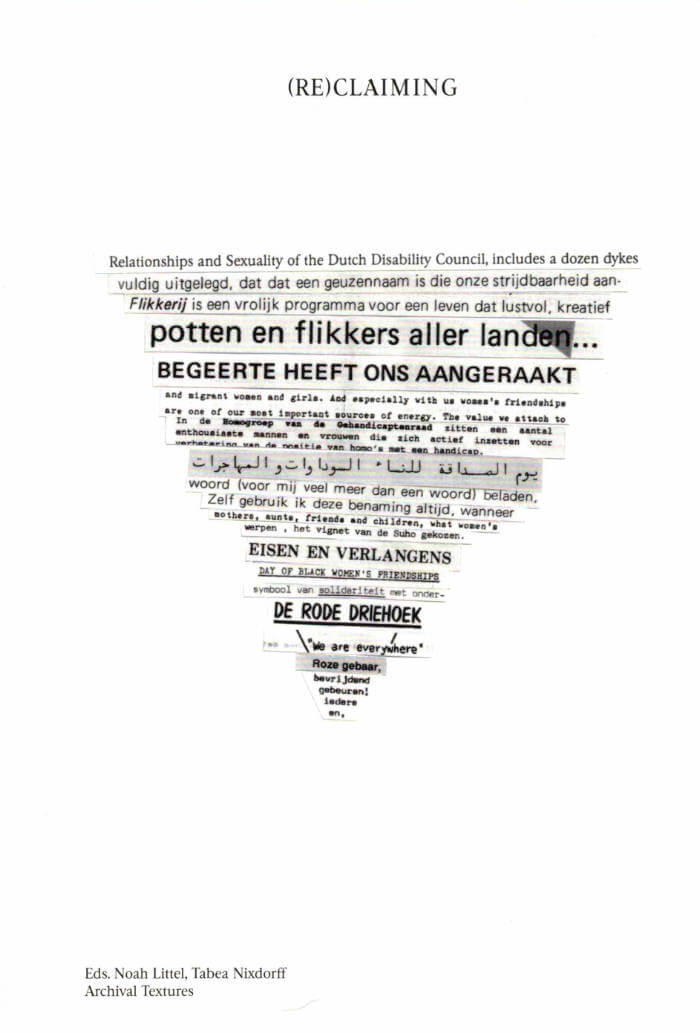
Archival Textures - (Re)claiming
The book (Re)claiming presents ways in which various queer and feminist communities and initiatives in the Netherlands have (re)claimed the triangle—along with other symbols, words and stories—and in doing so take up an empowering position in a hostile society.
Besides a collection of buttons, archival materials featured in this book include short statements and flyers by queer groups such as SUHO, Sjalhomo, Roze Front, Roze Driehoek, Roze Gebaar, Van Doofpot tot Mankepoot, Interpot/ILIS, Lesbisch Archief Amsterdam, Strange Fruit Vrouwen and Groep Zwarte Vrouwen Nijmegen, as well as a text by Karin Daan, the designer of the Homomonument in Amsterdam. With this selection, this book brings together queer, trans, crip, feminist, Jewish and Black perspectives on (re)claiming as an activist strategy.
Most of these materials were researched at IHLIA LGBTI Heritage in Amsterdam, with additions found at the International Institute of Social History and the International Archive for the Women’s Movement (IAV-Atria) in Amsterdam, and LAN Lesbisch Archief Nijmegen.

Survival Takes a Wild Imagination: Poems
In the powerful follow up to her critically acclaimed debut collection, poet and activist Fariha Róisín is writing, praying, clawing, and scratching her way out of the grips of generational trauma on the search for the freedom her mother never received and the kindness she couldn’t give.
This collection of poetry asks a kaleidoscope of Who is my family? My father? How do I love a mother no longer here? Can I see myself? What does it mean to be Bangladeshi? What is a border? Innately hopeful and resolutely strong, Fariha's voice turns to the optimism and beauty inherent in rebuilding the self, and in turn, the world that the self moves through. Ubiquitous to the human experience, Survival Takes a Wild Imagination is an illuminating breath of fresh air from a powerful poetic voice.
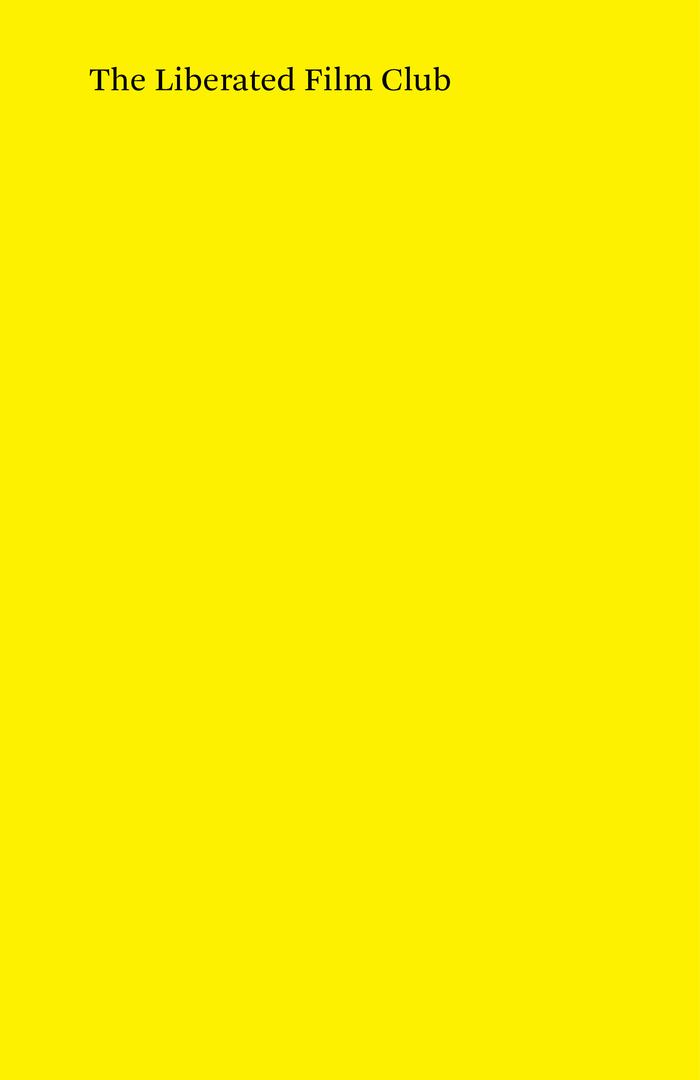
The Liberated Film Club
The Liberated Film Club—running from its birth to its death, 2016 to 2020—would guarantee a wide wing-span for critical conversation. Screening “Liberated film” (a loose category designed to scaffold the show), a guest would be invited to introduce a film; an audience seated to watch it through; but there’d be an interruption to that typical format. Neither the audience nor the guest would have any idea what film would be shown, and this anonymised format would invite broad and antagonistic perambulation on the what, the why and the how of film.
An interrogation of what we do when we sit in a cinema; a reckoning with the kind of posture we should assume when we frame a film for further talk. Playing with the various ways we should consider and reproach the institutions built around all of our cultures of making and the manners and methods of all of our cultures of consumption, the Liberated Film Club was a rare reflection on the act of reflection itself.
An anthology publication,
featuring contributions from
John Akomfrah;
Chloe Aridjis;
Dennis Cooper;
Laura Mulvey;
Chris Petit;
Mania Akbari;
Elena Gorfinkel;
Juliet Jacques;
Ben Rivers;
Dan Fox;
Sean Price Williams;
Adam Christensen;
Stewart Home;
Stephen Watts;
Tony Grisoni;
Gideon Koppel;
Astra Taylor;
Miranda Pennell;
Gareth Evans;
Adam Roberts;
Tai Shani;
Anna Thew;
Xiaolu Guo;
Andrea Luka Zimmerman;
William Fowler;
Athina Tsangari;
John Rogers;
Shama Khanna;
Shezad Dawood;
Damien Sanville;
& Stanley (& Winstanley) Schtinter.
(Eds.) Stanley Schtinter,
with Dominic J. Jaeckle
& Jon Auman

Ghostly Matters: Haunting and the Sociological Imagination
Drawing on a range of sources, including the fiction of Toni Morrison and Luisa Valenzuela (He Who Searches), Avery Gordon demonstrates that past or haunting social forces control present life in different and more complicated ways than most social analysts presume. Written with a power to match its subject, Ghostly Matters has advanced the way we look at the complex intersections of race, gender, and class as they traverse our lives in sharp relief and shadowy manifestations.
“Ghostly Matters immediately establishes Avery Gordon as a leader among her generation of social and cultural theorists in all fields. The sheer beauty of her language enhances an intellectual brilliance so daunting that some readers will mark the day they first read this book. One must go back many more years than most of us can remember to find a more important book.” —Charles Lemert

Speed Glum Hero
Speed Glum Hero. Read it as an instruction: Speed, Glum Hero. Read it as an assertion of life, like, keep living, go on. It takes this kind of serious play to make any sense of this moment we are living through. This is a pamphlet about subjectivity splintering, substance, and legend. This is a pamphlet about complicity, tenderness, and distress. This is a pamphlet about what it takes to stay gripping to the earth. The only way out is through.
D Mortimer is a writer and artist from London interested in the crip unknown. Their first book Last Night a Beef Jerk Saved My Life was published by Pilot Press in 2021. Mortimer is a Techne scholar in trans auto fictions at The University of Roehampton. Their work concerns technologies of madness and their doctoral project is entitled, Beef Journals: Naming the Uncertain in Transgender Subject Formation.
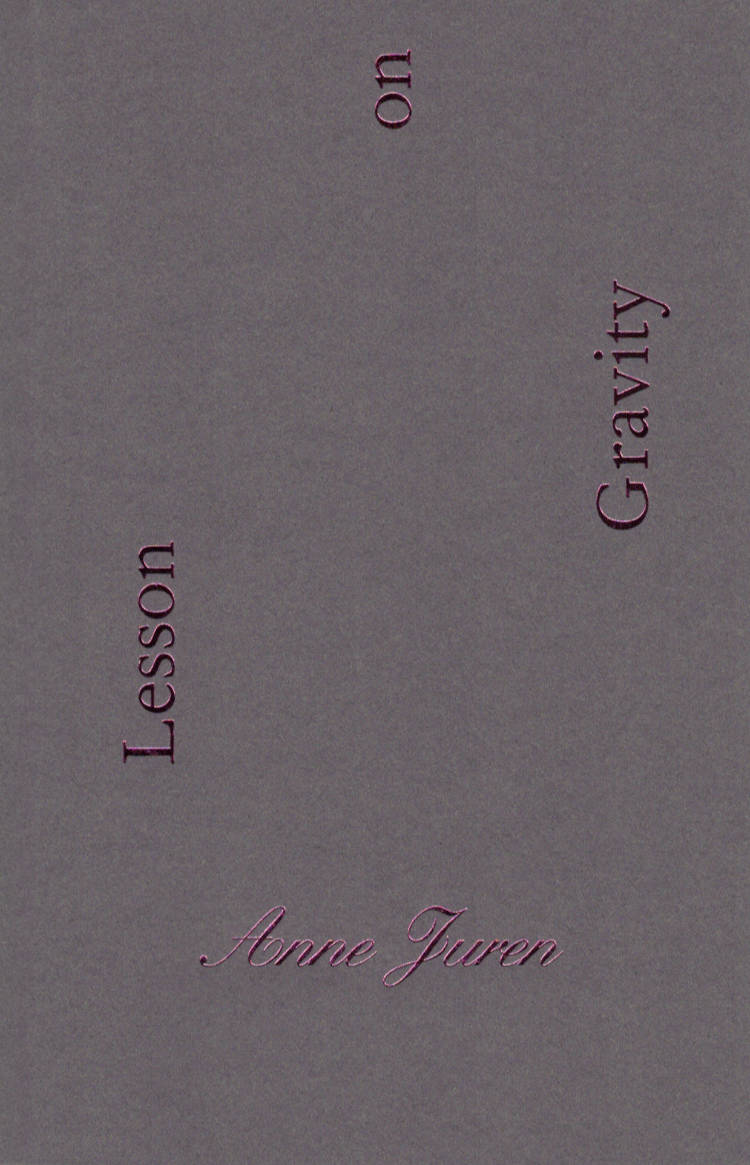
Lesson on Gravity
Lesson on Gravity is a slice of Anne Juren’s ongoing artistic research into ‘fantasmical anatomies’. ‘What happens when our sense of ground, orientation and support is lost? What are the risk and the promise of detaching ourselves from the pull of gravity?’ As this apocryphal Feldenkrais lesson embraces moments of intrusion and fragmentation, poetry and flights of fancy, it shows how language is alive, embodied and liquid. It also invites the reader to treat the book itself as a body, an unruly tongue sticking somewhere in its folds and creases
Anne Juren is a choreographer, dancer and Feldenkrais practitioner. In 2021 she finished her PhD at Stockholm University of the Arts with the project Studies on Fantasmical Anatomies.
Published by Varamo Press in the essay series Gestures
First edition, March 2023
Graphic design by Michaël Bussaer

Glass Urinary Devices
In 2015, artist Patty Chang (1972) followed the South-to-North Water Diversion Project, the longest aqueduct in the world, which brings water from southern to northern China. While walking, she collected her urine in plastic bottles, drinking their contents before refilling them, in turn drawing a connection between the large-scale infrastructural attempt to control the flow of water and the uncontrollable flows of her own body. Once back in Boston, Chang began making a series of portable urinary devices from discarded plastic bottles, which were then hand-blown in New York by glass-blower Amy Lemaire. In fashioning them from discarded plastic and rendering them permanent in glass, the devices channel Chang’s unfolding ruminations on water as a point of connection between geopolitics, human excess and waste. Designed by Sabo day, this indexical publication is the first book dedicated to depicting the series of sixty-four sculptures in its entirety. It was published on the occasion of Patty Chang’s exhibition at A Tale of A Tub, which ran from September 14–November 3, 2024.

mnemotope issue 003
This thrid edition of mnemotope magazine features pieces from contributors that range from playlist, recipes to poetic essays to drawings to private messages to a screenplay and beyond.
Mnemotope is a community magazine, published by bog bodies press. Mnemotope magazine takes this as its inspiration-it acts as a place in which lots of stories from across timelines and borders can sit together, and cultural memories can interact. It exists to create and hold the expression and knowledge of its diverse community, because of this, the contents of the magazine are wonderfully varied; some confessional poetry, some hastily notated recipes, some fiction, some history, lots of other things, all submitted during an open call. The format put spreads together of contributions that seem to somehow be in dialogue with one another.
The name of the magazine comes from a term that's used in writings about archaeological finds - it's a little complex when we speak about it abstractly, so take, for example, a bog body. A bog body is an object, but when we look at one it takes on another function as an image. This image is the part beyond the physicality of the object-it's what makes us think about what the world must have been like when this person was walking on it, what they looked like, what they did, who found them, how much the area they were found in must have changed and so on and so on and so on. A mnemotope is something that compresses time, and allows you to be in the bog two thousand years ago and in the museum looking at the body and at home reading about it all at once.
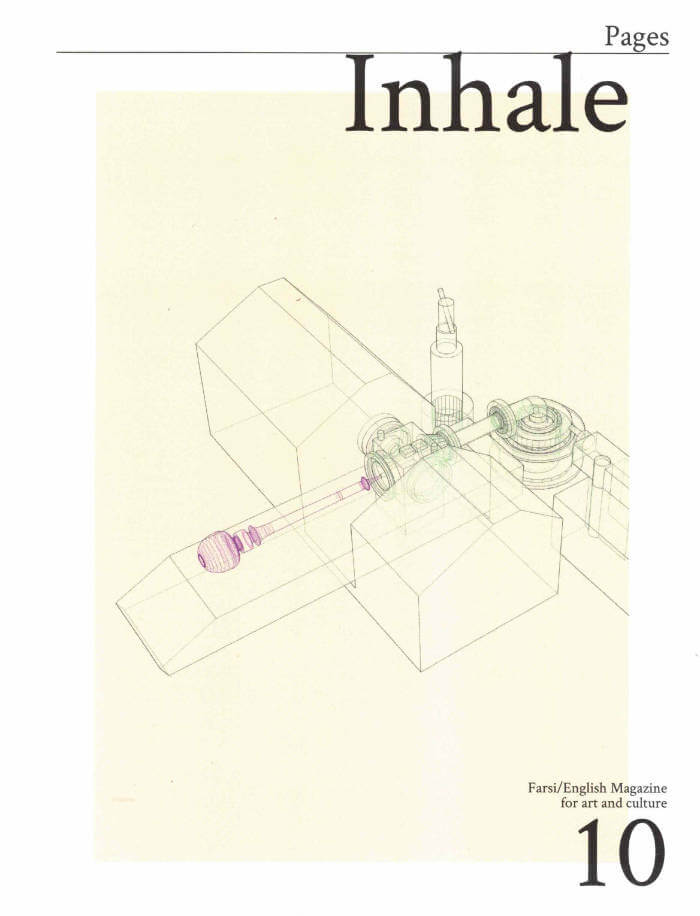
Pages 10 - Inhale
Nasrin Tabatabai, Babak Afrassiabi
The theme of this issue of Pages was triggered by the idea of opium smoke as a ‘writing machine.’ Since the early opium trade, there has been writing not only on opium, but also through opium, especially in countries linked to past and present drug networks. In this issue we are tapping into the deeply rooted relationship between writing and drugs, especially beyond the Western literary tradition, and wondering about the current conceptual and material derivatives of intoxication with which we can machinate new extremities in our chemical, historical and technological relations to the world.
With contributions by:
- Jason Bahbak Mohaghegh / Smoke, Drug, Poison: A Philosophy of the Faramoosh-Khaneh (Opium Den)
- Pages / Dissolving, Mixing, Melting, Stirring (the Smoke)
- Hung-Bin Hsu / The Taste of Opium: Science, Monopoly and the Japanese Colonization in Taiwan, 1895—1945
- Saleh Najafi / Hedayat: The Opium of Translation and Creating the Impossible Memory
- Patricia Reed / The Toxicity of Continuity
- Fuko Mineta / A Monster Appears in Qingtian
- Morad Farhadpour / Inside and Outside Addiction
- Mohammad-Ali Rahebi / Of Junk and Time: Trauma, Habit, Capitalism
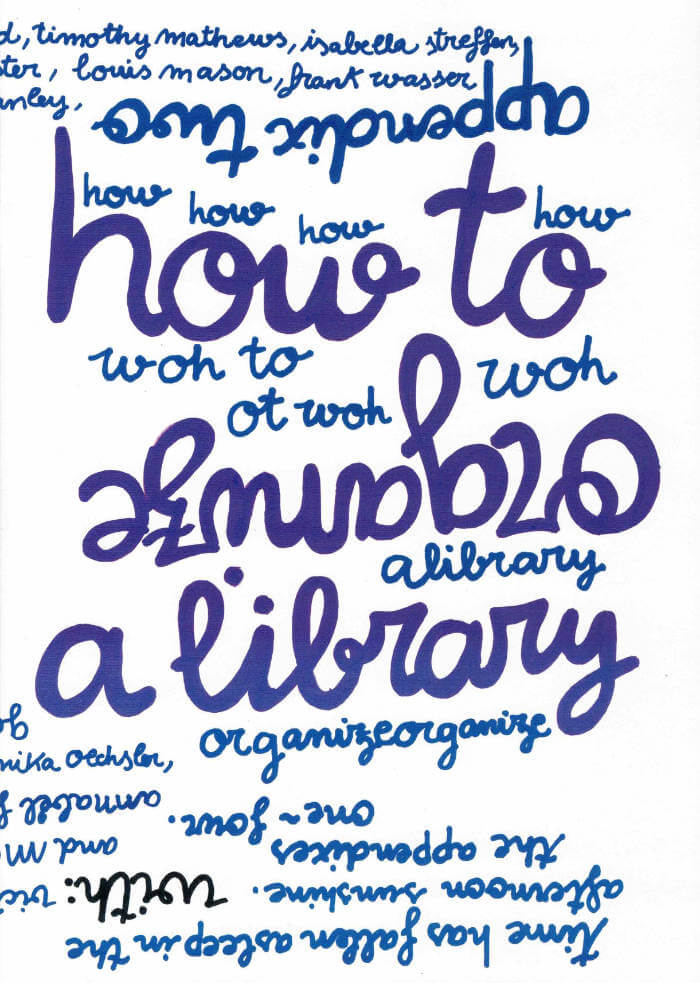
Time has fallen asleep in the afternoon sunshine
Appendix #2 - How to organize a library
Mette Edvardsen, Léa Poiré and 1 more
The Appendixes #1–4 is an editorial series by Mette Edvardsen, Léa Poiré and Victoria Pérez Royo that developed out of the project Time has fallen asleep in the afternoon sunshine. For a two-year residency at Les Laboratoires d’Aubervilliers* (2022–23), they came together as a small work group, shaping the work process, hosting presentation formats and making this publication series on paper as four cahiers.
The cahiers comprise a collection of commissioned texts and contributions created for this context, selected documents and traces from work sessions and encounters organized during their residency, texts read together and republished for this occasion, a collection of references, notes in progress, unfinished thoughts and loose fragments – on paper, between pages.
The Appendixes are organized around four themes: (1) The gesture of writing, (2) How to organize a library, (3) Orality and (4) Translation. In addition to being published on paper, the editorial series also consisted of other formats of presentations, exchanges and meetings organized as workshops, fieldwork, performances, conferences, collective readings and oral publications, taking place during their residency at Les Laboratoires d’Aubervilliers and in the vicinity.

Spring Brakers
An account of Spring Brakers, a project launched during the so-called First Wave. Spring Brakers was an online platform hosting video performances by a different artist each week alongside podcasts on various topics focusing on other labels or musical persuasions.
For this publication, all of the musicians who participated in the project are profiled, resulting in a grounded and oddly inspiring collection of testimonies of how artistic practices are shaped by an era that is still ongoing.
Artists include locals such as Bear Bones, Lay Low, Quanta Qualia, Vica Pacheco, KRAMP, Orphan Fairytale, and more, as well as far-out friends like Ka Baird, MSHR, Jung An Tagen, Eric Frye, and so on.
Each profile has a handy QR to redirect to each artist's video, and each copy includes a code to download a compilation made especially for the publication.

Not Working
Not Working brings together the contributions by artists, theorists and writers who in their work examine the interdependence of artistic production and social class.
The complex structures and substantial rise in social inequalities, particularly visible in light of the current pandemic, have given the concept of class a wide range of connotations. Despite the ongoing attempts to view contemporary art in the sense of "class homogeneity"; it remains complicit in the reproduction and masking of existing conditions which it often claims to overcome. The texts in this book form a ground were class can be mediated with respect to artistic practices and other structures in the art world.
Published on the occasion of the exhibition Not Working, Artistic production and matters of class at Kunstverein München in 2020.
Contributions by Maurin Dietrich, Melanie Gilligan & Marina Vishmidt, Annette Wehrmann, Stephan Janitzky & Laura Ziegler, Lise Soskolne, Josef Kramhöller, Leander Scholz, Dung Tien Thi Phuong, Steven Warwick, Mahan Moalemi.
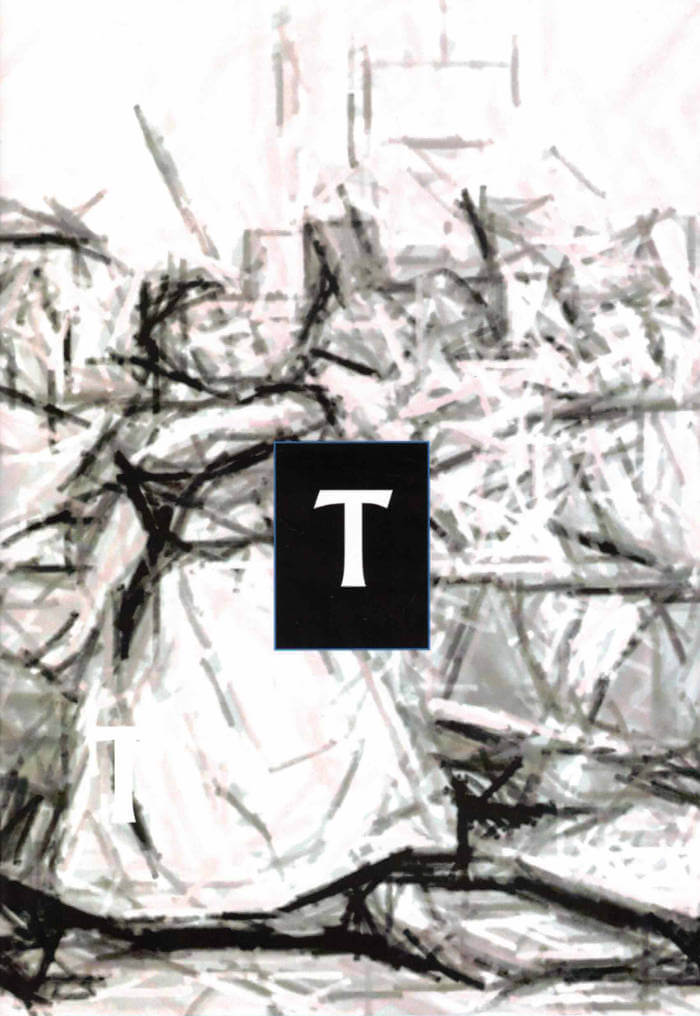
T (poem)
T is a long poem in multiple parts and its author's second book. “The two genders are YES and NO, so you stutter or else shut up forever”.
From the Afterword: "Between 2017-2018 I was involved in a trial with a group of TERFs after a scuffle emerged during a counter protest against a ‘debate’ about sex-based rights in light of proposed reforms to the Gender Recognition Act which would have made trans people’s lives marginally easier. Luckily I wasn’t actually in the dock, but I appeared to give evidence, and for everyone involved it was a humiliating ordeal as we were doxxed, harrassed online and in real life, while the relentless media campaign which ensued took a toll on the entire trans community. The caricaturesque reduction of a complex interrelation of political positions, epistemologies, traumas and personal grievances into two ‘sides’ ultimately worked to further the persecution of trans people, but nevertheless highlighted a social logic on whose terms the so called debate was forced to appear: sex was pitted against gender (or more revealingly ‘gender identity’), objective biology against subjective ‘self-identification’, nature against culture, or perhaps, first nature against second nature."
What does a poet say (what does anyone say), when placed on the stand, how answer the binary logics forced like a cage in the legally-grounded violence which splittingly interrogates solidarity, the splitting invocation of law? In answer, T spreads across the page as if desperately finding a form for speech acts forced into a garrotted tick-box, a witness stand, video evidence, Nature’s originary disguise as history or vice versa, wrapped inside ‘common sense’ as a pronominal shroud, in the policing of body, speech, and every fungible fibre of being. The author writes: “I want the whole text to be a kind of horrific inorganic body with awkward parts, both to replay at the level of form some of the critiques of organicist thinking with reference to nature that the poem tries to articulate, and also, more glibly, to be somewhat like a trans body, awkwardly fitting together with some parts undercutting others”. An extended enquiry into Materialism and its material (fleshed) stakes, driven through the heart and to the heart of things, T sees lyric poem shudder to line-broken essay to fragment of play to citational drop; in tight compression sprawling, a poem whose argument is necessary and necessarily incomplete, poetry can do thinking, this thinking we do outside and within it, sprung trap, open and closing door.

KAMERA CAHIER N° 10
A special edition issue curated, designed and published by AVARIE, Paris and Labor Neunzehn, Berlin. It accompanies KAMERA SERIES, while it is an independent and valuable object to collect. The central idea that informs and directs the booklets’ montage is the interplay between the concepts of addition and subtraction. This is achieved by unveiling a missing image in the screening or an unreleased second from an artist's film, expanded to 24 pages. Additionally, each booklet contains a piece directly removed from the show.
The editing establishes a dialogue between film frames and performed writings derived from texts, scripts, storyboards, and notes. The KAMERA exhibition is consequently extended into a physical space—the book—allowing for its widespread dissemination, complementing and contrasting with its potential online occurrence.
KAMERA SERIES is a screening program of experimental films, video art works and printed matter taking place in a former GDR building in Berlin. Each event showcases a retrospective of selected films by an artist and a small exhibition of his/her publications or works on paper over a span of 4 days.
KAMERA centers on fostering a critical dialogue between different film formats and artists’ books. Through its regular occurrence, it aspires to create a space for community exchanges about contemporary image-making. KAMERA is a series conceived and curated by Labor Neunzehn and AVARIE.
Fascinated by the intersection of visual art and cinema, Helga Fanderl’s short poetic films evoke intense and sensitive experiences of the real world. Using a small hand-held super 8 camera, she creates filmic responses to her perceptions, weaving together imagery and emotions in dense, rhythmic patterns solely through in-camera editing. She presents silent films in the form of ‘compositions’, crafting unique programs for site-specific personal projections and transforming spaces into temporary cinemas.

How to Mend: Motherhood and Its Ghosts
In How to Mend: On Motherhood and its Ghosts, Kayfa ta’s 4th monograph, Iman Mersal navigates a long and winding road, from the only surviving picture of the author has with her mother, to a deep search through what memory, photography, dreams and writing, a search of what is lost between the mainstream and more personal representations of motherhood and its struggles. How to mend the gap between the representation and the real, the photograph and its subject, the self and the other, the mother and her child.
Iman Mersal is an Egyptian poet and associate professor of Arabic Literature and Middle Eastern Studies in the University of Alberta, Canada.
Text: Iman Mersal
Editors: Maha Maamoun and Ala Younis
Translated from Arabic by Robin Moger
Co-publishers: Kayfa ta and Sternberg Press
Design: Julie Peeters
Size: 9.6 x 14.8 cm
Pages: 168 pages, Soft cover

De-/Anti-/Post-colonial Feminisms in Contemporary Art and Textile Crafts
Twelve essays discussing De-/Anti-/Post-colonial Feminisms in contemporary art and textile craft. This book discusses the theoretical problems of each of these 3 approaches and each author in the book takes a different perspective on the relationships between them. These differences matter. The authors come from France, Sweden, USA (Chicano/First Nation/Black American communities), India, South Africa, The Netherlands, Pakistan, India and UK. They discuss a wide range of practices from contemporary women artists, independent teaching initiatives, experimental film and its histories, avantgarde theatre and women's craft practices in rural communities in conflict areas.
![Cover of Dante's Joynte: Lingua 1. [Poems and Other Theaters]](https://rile.space/storage/744/dante.jpg)
Dante's Joynte: Lingua 1. [Poems and Other Theaters]
Kenneth Gaburo (1926-1993) is renowned as a teacher, pioneer of electronics in music, jazz pianist, writer, ecologist, publisher, and proponent of compositional linguistics. Over the course of a dedicated career, his uncompromising work carved out its own patch in the territory of American experimentalism.
Lingua Press, 1976
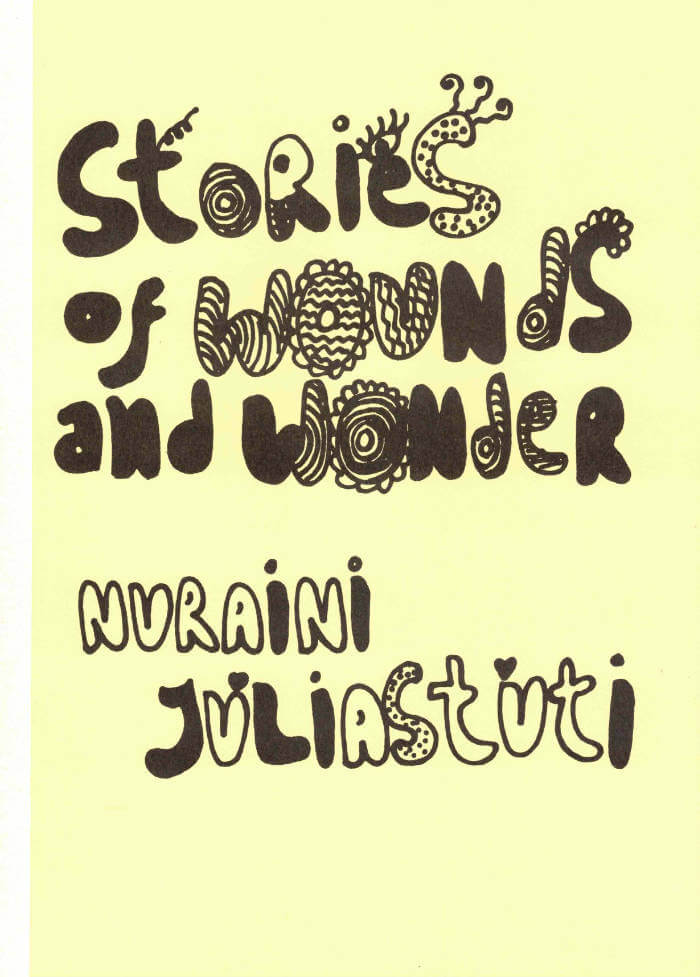
Stories of Wounds and Wonder
This experimental children’s book narrates cross-species practices of survival across the Indonesian archipelago, centring the perspectives of local animals such as endangered monkeys, cosmopolitan rats, migrant sparrows and fugitive dogs. Written in the form of a play, its six episodes ground the readers in the animals’ struggles and aspirations as they go about their daily lives and face the consequences of postcolonial erasure, ecological destruction and capitalist expansion. While the stories unfold, their interconnected existences become an archive of uncertainties, where the fate of many different creatures, humans included, is inseparable from each other.
As a script for intergenerational transmission, the book thoughtfully combines dialogues, songs and drawings, with contextualising essays and extensive notations. Through these different modes of reading, children and adults alike will learn about cross-species solidarity and rebellious movements, but also about disappearing Indigenous cosmologies, and the brave women who wove cloths around the mountains in eco-political resistance.

I have brought you a severed hand
Ghayath Almadhoun, Catherine Cobham
Fluid and unselfconscious, Ghayath Almadhoun writes love poems in the shape of nightmares: I have brought you a severed hand is a surreal mix of absurd humour, heteroerotic lust and dead seriousness. Caught between two exiles, the one inherited from his Palestinian father and the one he chose and lives, Almadhoun attempts to explain water and tame hope.
This book never misses the defiant beat of an exile’s haunted footing across wars, seas and memory. Almadhoun turns the genocidal logic of colonialism upside down, emptying out the crumbs of humanity and civilisation. —Don Mee Choi
Almadhoun uses every possible means of silence to make the total devastation palpable. —Alfred Schaffer
Many poets attempt to traverse the gulf between the experience of tragedy and the ability to relay its magnitude to anyone else. But few living have done it with such flourish, such sustained passion and formal precision as Ghayath Almadhoun. —Kaveh Akbar
Ghayath Almadhoun (born 1979, Damascus) is a Syrian-Palestinian poet who moved to Sweden in 2008. He has published five collections of poetry in Arabic, the latest being Adrenalin (Almutawassit, 2017) and I have brought you a severed hand (Almutawassit, 2024). In 2017, Adrenalin was translated into English by Catherine Cobham and published by Action Books. In 2023, Almadhoun curated, edited and translated the poetry anthology Kontinentaldrift: Das Arabische Europa (Verlag Das Wunderhorn and Haus für Poesie), which includes thirty-one Arabic poets living in Europe. The English translation of I have brought you a severed hand is published simultaneously by Divided in the UK and Europe and by Action Books in the USA. Almadhoun currently lives between Berlin and Stockholm. His work has been translated into nearly thirty languages.
Catherine Cobham taught Arabic language and literature at the University of St Andrews, Scotland, for many years and was head of the department of Arabic and Persian from 2011 until 2021. She has translated the work of a number of Arab writers, including poetry by Adonis, Mahmoud Darwish, Ghayath Almadhoun, Tammam Hunaidy and Nouri al-Jarrah, and novels and short stories by Yusuf Idris, Naguib Mahfouz, Hanan al-Shaykh, Fuad al-Takarli and Jamal Saeed. She has written articles in academic journals and co-written with Fabio Caiani The Iraqi Novel: Key Writers, Key Texts (Edinburgh University Press, 2013).